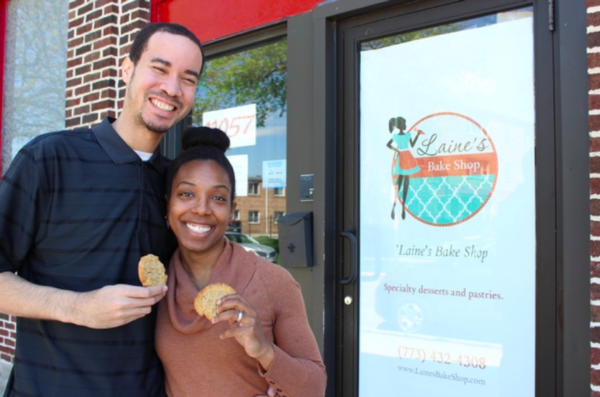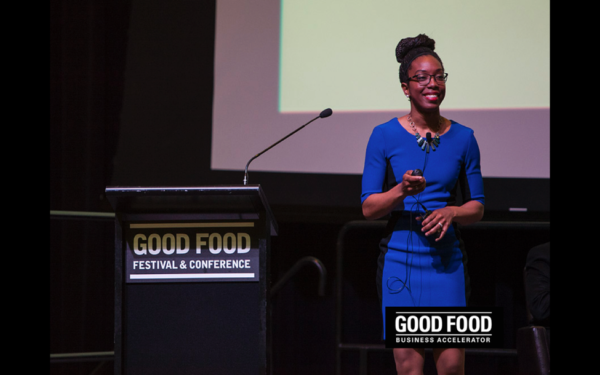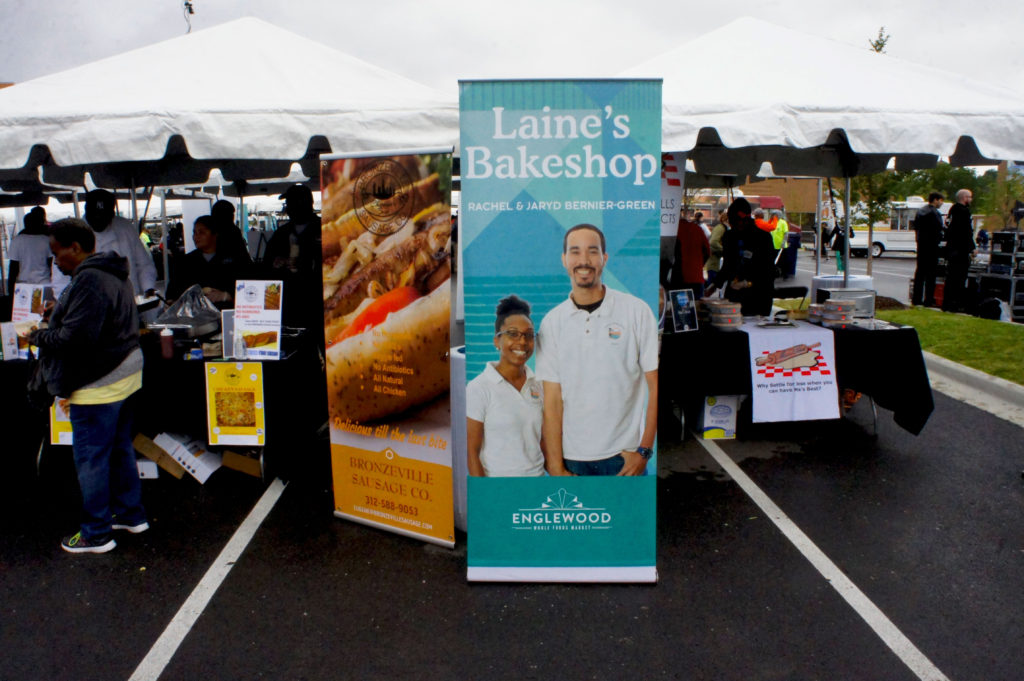by Chelsea Callahan, FamilyFarmed
‘Laine’s Bake Shop is an artisan bakery with a social mission. “Our mission is to be a catalyst for revitalization in urban communities, beginning in the South Side of Chicago,” said Rachel Bernier-Green, who co-founded the company with husband Jaryd Bernier-Green in 2013.
That social mission is why she will be sharing her experiences on a panel titled Urban Impact Investing and Community Revitalization on Thursday morning, at FamilyFarmed’s Good Food Financing & Innovation Conference at Chicago’s UIC Forum.
Bernier-Green also is one of four alumni of FamilyFarmed’s Good Food Business Accelerator who, along with all nine current Fellows, will be exhibiting at the Conference’s Financing Fair Thursday afternoon.
Last July, Bernier-Green opened the current small brick-and-mortar ‘Laine’s Bake Shop in Chicago’s Morgan Park neighborhood, after operating out of shared kitchens for three years and catching the attention of major retail outlets such as Whole Foods Market and Starbucks.

Jaryd and Rachel Bernier-Green outside the tiny ‘Laine’s Bake Shop store and bakery in Chicago’s Morgan Park neighborhood. After less than a year there, they are already scaling up to a new baking facility in the Bridgeport neighborhood and a new store, with a cafe, in the Pullman neighborhood. Photo: DNAInfo
The population in Morgan Park — tucked into the southwest corner of sprawling Chicago — is about two-thirds African American. While it has not been hit as hard by population and economic decline as many neighborhoods on the South and West sides, it has its problems.
Bernier-Green is acutely aware of that, and of the bigger problems facing other Chicago communities, as she prepares to replace the current production and retail location with a larger production facility in Bridgeport and a café style retail space in Pullman on the far South Side this summer. At the same time, they’ll be working on a new location in the Bronzeville community closer to downtown Chicago that will open next year.
That is why her three-part approach to ‘Laine’s social mission is led by who her company employs: The company hires from the hardest-hit communities. These are defined both geographically — by looking at neighborhoods with higher unemployment — and by background, considering groups of people with barriers to employment who would otherwise have trouble finding a job.
The second way is by sourcing from companies that have similar values. “Instead of saying we just want local products, we look at the ownership of the company. Is it employee-owned, is it family-owned, is it minority- or woman-owned? How do they treat their employees? We want to support this ecosystem of socially conscious companies,” said Bernier-Green, who earned an undergraduate degree in accounting and a master’s degree in taxation at the University of Illinois.
The third way is with their Community Partner Program, under development, through which they will support non-profits in the area that have an impact in areas of food access, economic justice, health care and more.
According to Bernier-Green, The Community Partner Program was a direct result of being in the Good Food Business Accelerator in the 2015-16 cohort “and thinking, ‘Okay, how do I tie our purpose to why we exist?’” In order to further their social mission, Rachel and Jaryd Bernier-Green began seeking out non-profits as partners to make a bigger impact in distressed urban communities.
Currently, they are working on a loyalty program that will allow customers to pick which non-profit they want to support from the Community Partner Program and a percentage of the proceeds will go to that non-profit. The loyalty program will launch this summer.
Before they launch the official program, they are working on a blog that will highlight the community partners and other fundraising initiatives that aim to drive money towards these good causes.

Rachel Bernier-Green, then a Fellow in FamilyFarmed’s Good Food Business Accelerator, did a business pitch for ‘Laine’s Bake Shop at the 2016 Good Food Financing & Innovation Conference. At this year’s Conference, on Thursday at Chicago’s UIC Forum, ‘Laines will participate in the Financing Fair. Photo: FamilyFarmed
Bringing Back Jobs and Opportunities
When asked about the impetus for her business and its strong social mission, Bernier-Green traced it back to her childhood and the radically different urban landscape that her grandfather described:
“The reason our business was created is because I grew up listening to stories from my grandfather. He grew up on the South Side of Chicago and he would tell us these stories about Bronzeville and Englewood and how they were really the epicenters of commerce and culture. But the South Side since I’ve been born did not look that way. His stories really opened my eyes to the way it used to be, which gave me the heart for redeveloping these communities. That was where our mission to be a catalyst for urban revitalization came from — from listening to him.”
This spring, ‘Laine’s will shutter its current tiny baking kitchen and store, and first move to a larger production space to fulfill the growing demand for their products. The current tiny grab and go retail operation also will blossom with the new, larger space in Pullman, which will allow for the café style experience they always imagined when starting the business, to be followed by the location in Bronzeville.
The Bernier-Greens have had to get creative on how to finance their big ideas as they expand into economically distressed urban areas. As she describes it, “It’s about being mindful about what’s coming and being committed to neighborhoods even when it’s not all there yet.”
She continued, “That’s a big part of urban impact investment. You have to take those steps when the whole picture is not in place, and so there’s a risk of being in the front and the money has not caught up.”
Going through this process has shown Bernier-Green the necessity of public-private partnerships to drive impact in these areas. For ‘Laine’s Bake Shop, success in this space meant working with non-profits such as Chicago Neighborhood Initiatives, Urban Juncture, and Greater Englewood CDC, which are focused on urban revitalization and development in the retail space.
So what can be done to promote local and sustainable food as a means to economic development? Bernier-Green believes that we just need to show that these social food business models are economically viable.
She commented, “A lot of times people think if you’re doing good, you can’t also make money, but there are a lot of companies that have implemented these models successfully, profitably and sustainably. We just need to realize while it’s becoming more prevalent, we’re not reinventing the wheel. This isn’t a completely new concept, it’s been proven.”
And she’s part of the solution, proving it again with her own successful socially driven business that is working to create new opportunities and revitalize communities through Good Food.
The Good Food Conference Panel
Bernier-Green will be joined on the Urban Impact Investing and Community Revitalization panel Thursday by Michael Bashaw, president of Whole Foods Market’s Midwest region.
Bashaw — who also is a co-chairman of the Good Food Financing & Innovation Conference— leads a region with 54 stores and more than 10,000 employees. He was instrumental in the development of the Whole Foods stores that opened in the Chicago South Side neighborhood of Englewood in 2016 and in Detroit in 2014.
Whole Foods’ Englewood store was the upscale chain’s first venture into a poverty-plagued urban community, and Bashaw and his team made a point of seeking out local food entrepreneurs for products to stock in the store. ‘Laine’s Bake Shop was one of these.

‘Laine’s Bake Shop was one of the local food businesses highlighted by Whole Foods Market when it opened its store in Chicago’s economically challenged Englewood neighborhood. Photo: Bob Benenson/FamilyFarmed
Also sharing their expertise on the panel are:
• Malini Ram Moraghan, principal of Drawing Board and a consultant to the Kresge Foundation, which recently announced a $90 million initiative in six metropolitan areas, including Chicago, to promote equitable infrastructure investments.
• Mark Thomann, co-founder of Spiral Sun Ventures, a new fund that is investing in a number of urban food enterprises.
FamilyFarmed President Jim Slama will moderate the discussion.
To learn more about the Good Food Financing & Innovation Conference — which kicks off the three-day Good Food Festival & Conference — and to buy tickets, please visit the event website.
